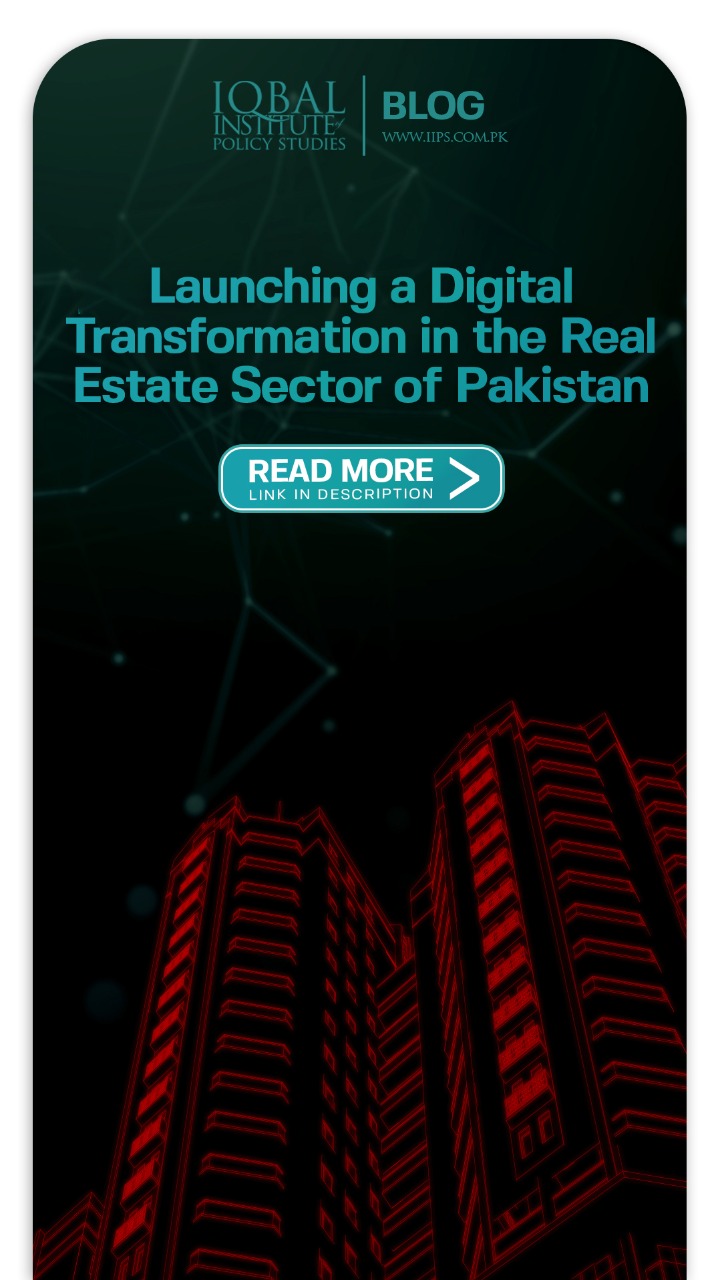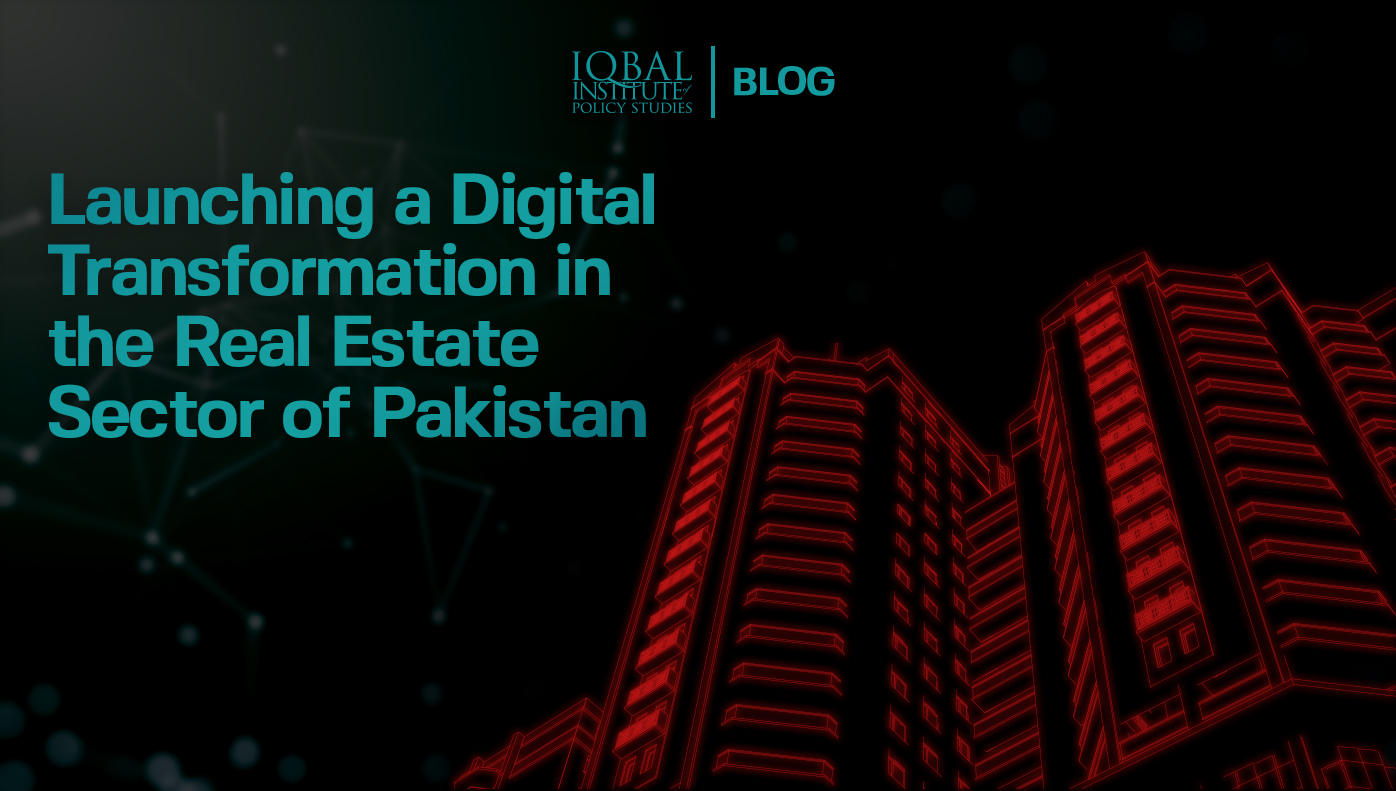Introduction
In the era of the fourth industrial revolution, no sector of the economy is safe from a digital transformation. The same is true for the real estate sector of Pakistan. With global real estate being valued at more than USD 228 trillion, it can safely be considered the world’s largest and most valuable asset. Having horizontal and vertical linkages with several other sectors of the economy, real estate plays a vital role in developing a country’s infrastructure and human resources. According to McKinsey Global Institute, China’s net worth reached US$ 120 trillion on the back of its red-hot real estate market and property valuations. According to Propsure Digital Solutions, a leading online property verification service, Pakistan’s true economic potential remains untapped due to several challenges hampering the growth of its real estate sector. Be it the century-old system for revenue collection and land management, outdated government records, lack of access to reliable information, or the sector’s lack of regulations; several challenges impede growth and investor confidence. However, using modern technologies to address these challenges can help Pakistan unlock the true potential of its real estate economy. The country needs a digital transformation to restore consumer and investor confidence in Pakistan’s real estate market.
Continue reading to understand how Pakistan can tap into its real estate sector’s true potential by a digital transformation in urban Pakistan.
Real Estate in Pakistan: Challenges and Growth Prospects
Pakistan’s real estate sector can make the country a USD 1.5 – 2 trillion economy in the next 15 to 20 years. However, several challenges need to be addressed to realise the sector’s full potential. At present, out of the total 796 thousand sq. kilometres of land area in Pakistan, only 3500 sq. kilometres is planned in urban cities, making up only 0.5% of the total. Considering that most of the infrastructural development in Pakistan is not inclusive, rising population and migrations from rural to urban areas contribute to the development of informal settlements in the form of slums. As planned development leads to seven times greater property valuation than unplanned development, a large portion of unplanned real estate in the form of housing and commercial area fails to generate value for the economy.
Being the most valuable asset in Pakistan, everybody wants to invest in real estate. However, almost every consumer or investor has faced challenges with property valuations and verification of documents in the buying or selling process. Not only does this open the market to widespread speculation, but it also generates mistrust amongst consumers and real estate professionals, a cause for their ill reputation in society. Pakistan’s century-old land records system and revenue collection methodology cannot keep up with the rising demand for access to vital information required for making a duly diligent real estate investment. This leads to multiple frauds in the form of illegal housing schemes and development projects. If investors want to verify details like ownership and relevant approval documents, the slow and cumbersome process forces them to ignore these important steps and rely on their agent’s word. If Pakistan wants to achieve economic growth and human development on the back of its real estate sector, a digital transformation is required in the real estate industry.
Furthermore, due to an outdated and weak regulatory framework surrounding real estate in Pakistan, more than 60% of all cases in Pakistan’s judicial courts are directly or indirectly related to real estate. Moreover, 70% of all complaints from overseas Pakistanis on the prime minister’s portal also pertain to investments and dead capital stuck in real estate projects based on misleading advertisements. Countries like the UK, UAE, and India have real estate regulatory authorities that oversee the activities of builders and developers so that no consumer or investor may be defrauded while investing in real estate projects. This ensures investor confidence in the sector and allows consumers and investors to make safer decisions. Although the first step towards establishing a real estate regulatory authority has been taken in the Federal Capital of Pakistan, Islamabad, its actual implementation is yet to be seen.
How can a Digital Transformation help Uplift the Real Estate Sector of Pakistan?
A digital transformation in the real estate sector of Pakistan is possible by following a four-step process. By digitising real estate data, launching an online property verification system, launching an online land registry system, devising a conceptual master plan based on modern urban planning principles, and conducting a demographic study of a population’s skillset to ascertain the best course of development in future, the real estate sector can be revolutionised in the coming years.
First Phase – Digitised Data
Pakistan’s real estate sector is marred by a century-old Land Management System devised by the British during colonial rule. It is a document-based system that is highly susceptible to tampering by revenue collection officers and has many loopholes and inefficient processes associated with the transfer of land and ascertaining ownership. It is also a primary factor for the rising number of cases related to real estate in the judicial courts of Pakistan. With an increase in the demand for transparency in real estate processes, digitisation of data is the most important step in revolutionising the real estate sector of Pakistan and realising its true potential in the future.
Many developed and developing countries have utilised digital cadastral mapping of land to ensure transparency and easy access to information for the general public. Using GIS technologies, a digital map is integrated with data based on several indicators that help in verifying vital details related to a land parcel over a single platform. Not only does this allow investors to conduct due diligence regarding their future real estate investments, but it also creates an enabling environment for developers and builders to launch new development projects based on reliable and authentic data.
Second Phase – OPVS and OLRS
In the second phase, data from the digitisation process can be used to create an online property verification system that helps investors and consumers make informed decisions. The system is equally relevant for builders and developers aiming to establish new real estate projects in the country. By establishing projects on verified properties, investors and consumers can safely invest their life savings without worrying about future litigations and trials. The system can also be used to conduct feasibility studies for new projects as infrastructure development driven by consumer demand has a higher chance of success compared to haphazard construction. Having a reliable property verification system also mitigates the chance of fraud for overseas Pakistanis.
Another major step towards digitising the real estate sector in Pakistan is to establish an online land registry system. The system can be a reliable, effective, and transparent method for registration and transfer of ownership. Scores of people get defrauded during these processes as they do not understand what documents the relevant authorities require and what processes must be ensured for protection from future litigations. Land registration in Pakistan is also marred by several malpractices on the part of the revenue collection officers. The system can also act as a stronghold against land mafias by maintaining a digital record of authentic ownership titles with several government departments and associated authorities. Utilising the system can revamp the real estate sector of Pakistan and allow for international best practices to be applied throughout the industry.
Third Phase – Conceptual Master Plan
As discussed earlier, the importance of planned development cannot be understated. Not only do planned areas utilise land in the best possible way, but they also generate significant value for society’s overall economy and human development. After digitising data and devising an online land verification and registry system, developing a conceptual master plan for future infrastructural development can greatly reduce the chance of unplanned urbanisation and the subsequent challenges that follow. Understanding population growth trends and patterns of rural to urban migrations can allow urban planners to predict future needs for infrastructure. The process can also be used to understand the best possible options for future projects. Suppose an area is void of housing units, then it does not make sense to establish a large commercial centre as it will not have the desired level of footfall and engagement required for successful business growth. Similarly, the process also allows for the planning of transport networks, health and education infrastructure, industrial zones, and third-use places. Artificial intelligence and Big Data analytics in this area can provide a revolutionary outlook. These tools can factor in several aspects that can otherwise be overlooked during human consultation. Therefore, developing a conceptual master plan is perhaps the most important step that will guide the future of real estate in Pakistan. It will also be a critical factor in deciding the value real estate generates.
Fourth Phase – Skill Set Mapping
The last step of the digitisation process is to map the skill set of the population along with their demographic data. It might not be as apparent as the previous steps as to how this process is connected to real estate development. However, knowing the skillset of a population can help in deriving deep insights into the demand for future developments and human resource upgradation. Economies seldom work in a solitary fashion. They are a mix and collaboration of several entities that require close collaboration and integration with one another. Besides housing and commercial development, industry and tourism are also a major part of real estate. To ignore their importance is to leave a major chunk of the real estate sector’s potential behind. Mapping the skill set of a population can also help in the successful establishment of new industries. However, the growth and development of a society are strongly dependent on how much human development takes place. And therefore, it is vital for sustainable growth that real estate development takes place in line with human development.
Conclusion
The real estate sector of Pakistan presents a massive opportunity for the country to uplift its economy and ensure human development over time. It is the largest and most valuable asset of the country, with deeply rooted connections to multiple other sectors of the economy. Planned and sustainable development of real estate can generate significant value for Pakistan. However, the real estate sector is marred by several challenges associated with lack of regulations, lack of access to information, and resulting malpractices that tarnish investor confidence and help fuel the development of informal areas. Transforming the real estate sector through a digital revolution can become the key to unlocking the true potential of real estate in Pakistan. Through the digitisation of existing data, introduction of an online property verification system and an online land registry system, devising of a conceptual master plan for future development, and skillset mapping of current population clusters, the vision of a digital urban Pakistan can be realised.



Comments (1)
Very informative